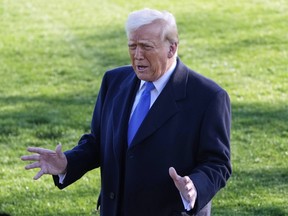The president has repeatedly referred to April 2 as ‘liberation day,’ that will usher in a new ‘golden age’ of investment for the United States
Article content
OTTAWA — Canada, as well as the world, is holding its breath as U.S. President Donald Trump is expected to announce new sweeping tariffs Wednesday against “key sectors,” a further escalation of a trade war that is upending the global economy.
Article content
Article content
Trump is to announce the new round of tariffs at 4 p.m. ET in the White House rose garden during an “Make America Wealthy Again” event. The new levies are expected to match trade barriers put in place by other countries.
Advertisement 2
Article content
Trump has characterized various Canadian non-tariff protections such as the dairy supply management system, the digital service tax and even the federal goods and services tax (GST) as indirect tariffs on U.S. exports.
The Canadian government, the European Union and many other affected countries have promised to retaliate to any new American tariffs on their exports.
Details of the new U.S. tariffs were still largely unknown as of press time, but they are likely to include the additional 25 per cent border levy against most foreign-made autos and components announced by Trump last week.
Vehicles imported under the Canada-United States-Mexico Agreement (CUSMA) free trade deal will only be tariffed on the value of components built outside the U.S., according to details released by the White House last week.
Trump has also promised to target imports of pharmaceuticals, semiconductors and softwood lumber, the latter would be blow to another major Canadian export to the U.S.
The president has repeatedly referred to the April 2 announcement as “liberation day” that will usher in a new “golden age” of investment in his country. Analysts and economists around the world have warned that further escalation by the U.S. of the trade war could plunge the country into a recession.
Article content
Advertisement 3
Article content
During a Tuesday briefing, White House press secretary Karoline Leavitt confirmed that the new auto tariffs would be collected as of 12:01 a.m. on Thursday, dismissing any hope of a phased-in approach that would allow affected countries to negotiate with the U.S.
The new tariffs are in addition to the 25 per cent border levy the U.S. imposed on steel and aluminum imports in early March and that remain in place.
Recommended from Editorial
Monday, the Wall Street Journal reported that Trump and his advisers were debating between imposing a universal 20 per cent tariff on all imports or implementing country-specific rates that could be negotiated.
During a campaign stop in Winnipeg on Tuesday, Mark Carney confirmed that Canada would retaliate to any new U.S. tariffs but promised that the response would not disadvantage Canadian industry and workers relative to Americans.
“We will put in place retaliatory measures if there are additional measures put against Canada tomorrow,” Carney said.
Advertisement 4
Article content
“We are going to be very deliberate in terms of the measures we take to fight for Canada … but also to protect (and) to have that minimal impact in Canada.”
On the eve of U.S. tariff announcement, Carney spoke to Mexican President Claudia Sheinbaum about increasing trade between both countries amid “challenging times ahead” with the Americans, according a readout from the Prime Minister’s Office.
Last week, Carney said the federal government was working on counter-tariffs, targeting billions of dollars in U.S. goods. As of Tuesday, the federal government was still working on multiple responses depending on what Trump announces Wednesday.
European Commission head Ursula von der Leyen said Tuesday that the European Union had a “strong plan” to retaliate to Trump’s new tariffs but would prefer not to have to implement it.
“Europe has not started this confrontation. We do not necessarily want to retaliate, but if it is necessary we have a strong plan to retaliate and we will use it,” she told the European Parliament, according to The Guardian.
After Trump announced the new tariffs against foreign auto imports last week, Carney said Trump had fundamentally changed his country’s relationship with Canada, the U.S.’s longest and closest trade partner.
Advertisement 5
Article content
“We will need to dramatically reduce our reliance on the United States. We will need to pivot our trade relationships elsewhere, and we will need to do things, previously thought impossible, at speeds we haven’t seen in generations,” Carney said Thursday.
Since then, he and Trump agreed that both countries would sit down to negotiate a new economic and security deal after the current federal election.
There remained some hope late last week that Canada would be spared additional tariffs after Trump struck a much more positive tone about his northern neighbour following his first call with Carney.
“We had a very good talk, the prime minister and myself, and I think things are going to work out very well between Canada and the United States,” Trump said after the call.
“We’re going to end up with a very good relationship with Canada and a lot of the other countries,” he continued, adding that it wouldn’t be the case with some others though.
The new tariffs are likely to throw a ton of bricks on the ongoing federal campaign as polls suggest that the U.S.-Canada trade war is voters’ top concern.
National Post
cnardi@postmedia.com
Get more deep-dive National Post political coverage and analysis in your inbox with the Political Hack newsletter, where Ottawa bureau chief Stuart Thomson and political analyst Tasha Kheiriddin get at what’s really going on behind the scenes on Parliament Hill every Wednesday and Friday, exclusively for subscribers. Sign up here.
Our website is the place for the latest breaking news, exclusive scoops, longreads and provocative commentary. Please bookmark nationalpost.com and sign up for our politics newsletter, First Reading, here.
Article content









